Call for Papers
ITDRR-2026 provides an international forum for researchers and practitioners to present their latest R&D findings and innovations in information technology for disaster risk reduction.
- Submission link: EasyChair – ITDRR-2026 (opens January 2026)
- Submission deadline: 30 April 2026
- Notification of acceptance: 19 June 2026
- Camera-ready deadline: 30 November 2026
Accepted papers will be published in the IFIP AICT series by Springer as post-conference proceedings (indexed in Scopus).
At least one author must register and present the paper (in-person or virtually). We also invite late-breaking poster presentations (details TBA).
Paper Templates & Instructions
- For templates and author guidelines, see the IFIP AICT Guidelines and Templates: IFIP AICT Guidelines (https://www.springer.com/gp/computer-science/lncs/conference-proceedings-guidelines)
- Supported formats: MS Word 2010–2016, LaTeX2e
- Paper length: 10–16 pages (including tables, figures, references)
- We draw your attention to the Springer Nature Code of Conduct, which
all authors must adhere to. (https://www.springernature.com/gp/authors/book-authors-code-of-conduct) - Papers will be double-blind reviewed for scientific merit, originality, and relevance.
- For examples of previous editions, see the proceedings from the ITDRR
conference series: ITDRR Previous Proceedings (https://link.springer.com/conference/itdrr)
Topics of Interest
Prospective authors are invited to submit high-quality papers addressing, but not limited to, the following themes:
- Advanced ICT for disaster management (IoT, edge computing, 5G/6G in crisis zones)
- Artificial Intelligence and disasters (explainable AI, generative models for forecasting)
- Climate change and disaster risk (tipping points, compound events)
- Community resilience and participatory technologies
- Climate information management and open data ecosystems
- Cloud/edge computing in emergency management
- Command, control, and coordination systems
- Crowdsourcing, digital volunteers, and citizen science
- Data analytics, visualisation, and decision support
- Digital transformation in emergency management
- Disaster information processing and semantic interoperability
- Disaster prevention, mitigation, preparedness, response, and recovery
- Disaster vulnerability and risk assessment mapping (multi-hazard, transboundary)
- Disaster monitoring and early warning systems
- Disaster information management systems
- Disaster communications (resilient networks, satellite backhaul)
- Emerging technologies for DRR (robotics, UAVs, digital twins, quantum sensing)
- Ethical, legal, and social implications of disaster tech
- Geographic Information Systems and remote sensing
- Hazard and vulnerability analysis (including systemic and cascading risks)
- ICT challenges in emergency management (interoperability, scalability)
- Integrated risk governance and multi-stakeholder platforms
- Mobile computing and emergency management apps
- Pandemic and health-emergency informatics
- Security, privacy, and trust in disaster management
- Simulation, gaming, and serious games for DRR training
- Situation awareness and Common Operational Picture
- Social media analytics and misinformation countermeasures
- Socio-economic impacts of disasters
- Universal design and inclusive DRR technologies
- VR/AR/MR for disaster training and public engagement
- Risk communication – core focus for 2026
- Multi-lingual, culturally attuned risk messaging
- Countering disinformation in real-time
- Visual and narrative risk storytelling
- Trust-building through transparent algorithms
- Community-led risk communication platforms
All accepted papers will be published in the IFIP AICT series by Springer (post-conference) and indexed in Scopus.
For details regarding participation costs and payment, please visit the Registration page.

